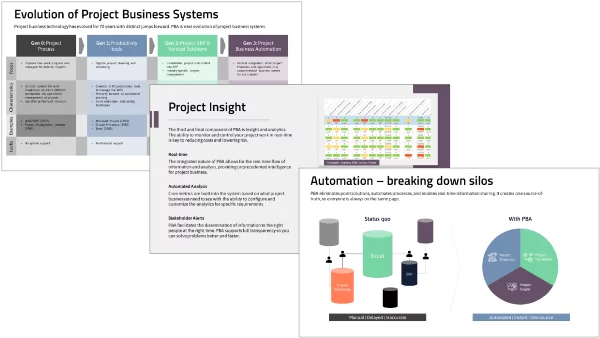The purpose of a PMO is to ensure success from every project in which the company engages so that it contributes value to the business. It accomplishes this through standardizing project processes and policies and by systemizing these methods through technology.
What Makes a Good PMO?
A project management office does more than just manage projects. It manages the project business of the company. That means it is responsible for the operational and financial aspects of the projects the company executes, ensuring profitability and value added to the company.
To be effective, a project management office needs to systemize its project business processes. By doing this, it ensures compliance, creates efficiency, and gains real-time insight into the company’s projects.
The most effective way of systemizing project business is with Project Business Automation (PBA). PBA is a new category of software solutions designed to manage your project business from end-to-end.
How Common is a PMO?
According to the Pulse of the Profession report from PMI, 71% of all companies have a project management office. To break it down even further:
- 90% of large enterprises have a PMO
- 88% of midsize companies have a PMO
- 61% of small companies has a PMO
PMO Roles and Responsibilities
A Project Management Office has many functions in the organizations and therefore may assume different roles.
However, the most common PMO functions include:
- Monitoring and control of projects
- Development of standard project execution processes and methodologies
- Selecting and implementing PMO software
- Managing project portfolios
- Optimizing resource allocation and utilization
- Project and portfolio analysis and reporting
- Project manager training and development
Project Management Office Structure
While there are many interpretations on different types of structure for your PMO, the Guide to the Project Management Body of Knowledge (PMBOK® Guide) gives three basic structures:
Supportive: Provides a consultative role to projects by supplying templates, best practices, training, access to information and lessons learned from previous projects
Controlling: Provides support and requires compliance through various means
Directive: Takes control of the projects by directly executing them
There are degrees of control the PMO exerts over the organization depending on which structure it follows. As such, the roles within the department will change depending on which structure it chooses.
PMO Positions
There can be different levels of management and positions within the PMO, depending on organizational size and project complexity. At every level, formal knowledge of project management is a must.
These are the levels and titles you might find:
PMO Head
This is the person in charge of the PMO responsible for the entire PMO function. Titles may include:
- Head of PMO
- PMO Director
- Portfolio Director
- Head of Project Management
- ePMO Manager
PMO Manager
This level of management is focused on the day-to-day operations of the PMO. Titles include:
- PMO Manager
- PMO Lead
- Project Office Manager
- Program Office Manager
- Portfolio Office Manager
- Project Office Lead
- Program Office Lead
- Portfolio Office Lead
PMO Support
Typically entry level, this support role helps the managers coordinate activities and gather information. Titles found here include:
- Project Administrator
- Project Office Coordinator
- Project Office Analyst
- Project Office Support












